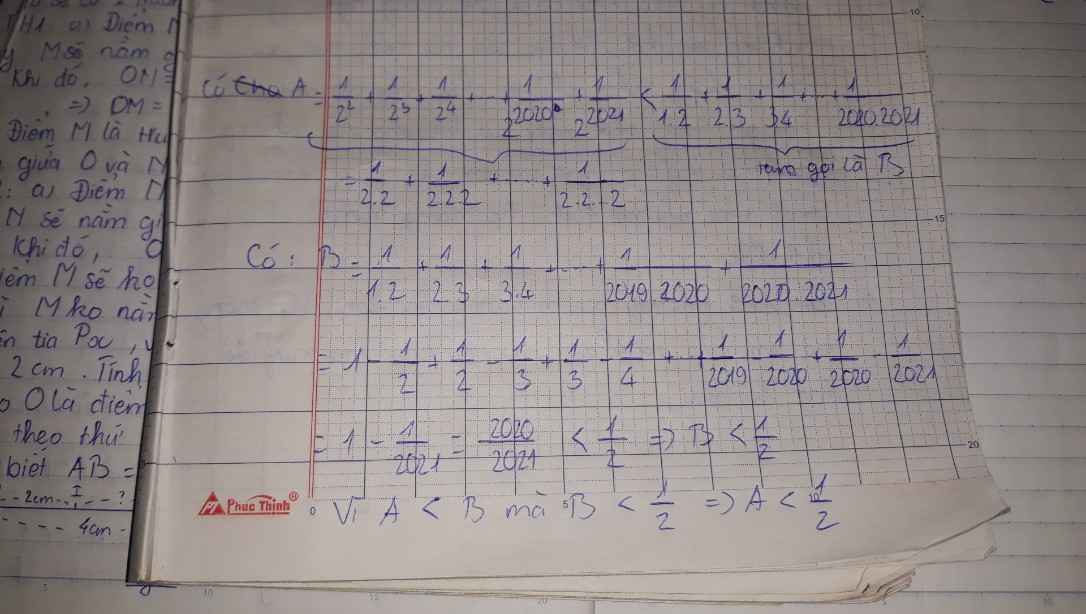A=\(\dfrac{1}{1^2}+\dfrac{1}{2^2}+\dfrac{1}{3^2}+\dfrac{1}{4^2}+...+\dfrac{1}{50^2}\)
GIÚP BÉ VỚI Ạ! ĐANG CẦN GẤP ![]()
Hãy nhập câu hỏi của bạn vào đây, nếu là tài khoản VIP, bạn sẽ được ưu tiên trả lời.

\(\dfrac{1}{3}-\dfrac{1}{x}=\dfrac{y}{2}\)
\(\Leftrightarrow\dfrac{x-3}{3x}=\dfrac{y}{2}\)
\(\Leftrightarrow2x-6=3xy\)
\(\Leftrightarrow x\left(2-3y\right)=6\)
\(x,2-3y\) là các ước của \(6\) nên ta có bảng giá trị:
| x | -6 | -3 | -2 | -1 | 1 | 2 | 3 | 6 |
| 2-3y | -1 | -2 | -3 | -6 | 6 | 3 | 2 | 1 |
| y | 1 | 4/3(l) | 5/3(l) | 8/3(l) | -4/3(l) | -1/3(l) | 0 | 1/3(l) |


làm vào bài đừng có dùng ngoặc kép như tui nha,tui làm minh họa cho bạn hiểu

a, Ta có :\(A=\dfrac{1}{2^1}+\dfrac{1}{2^2}+...+\dfrac{1}{2^{49}}+\dfrac{1}{2^{50}}\\ \Rightarrow2A=1+\dfrac{1}{2^1}+\dfrac{1}{2^2}+...+\dfrac{1}{2^{49}}\\ \Rightarrow2A-A=\left(1+\dfrac{1}{2^1}+\dfrac{1}{2^2}+...+\dfrac{1}{2^{49}}\right)-\left(\dfrac{1}{2^1}+\dfrac{1}{2^2}+...+\dfrac{1}{2^{50}}\right)\\ \Rightarrow A=1-\dfrac{1}{2^{50}}< 1\\ \Rightarrow A< 1\) Vậy \(A< 1\)
b, Ta có :
\(B=\dfrac{1}{3^1}+\dfrac{1}{3^2}+...+\dfrac{1}{3^{100}}\\ \Rightarrow3B=1+\dfrac{1}{3^1}+\dfrac{1}{3^2}+...+\dfrac{1}{3^{99}}\\ \Rightarrow3B-B=\left(1+\dfrac{1}{3^1}+\dfrac{1}{3^2}+...+\dfrac{1}{3^{99}}\right)-\left(\dfrac{1}{3^1}+\dfrac{1}{3^2}+...+\dfrac{1}{3^{100}}\right)\\ \Rightarrow2B=1-\dfrac{1}{3^{100}}< 1\\ \Rightarrow B< \dfrac{1}{2}\)Vậy \(B< \dfrac{1}{2}\)
c, Ta có :
\(C=\dfrac{1}{4^1}+\dfrac{1}{4^2}+...+\dfrac{1}{4^{1000}}\\ \Rightarrow4C=1+\dfrac{1}{4^1}+\dfrac{1}{4^2}+...+\dfrac{1}{4^{999}}\\\Rightarrow4C-C=\left(1+\dfrac{1}{4^1}+\dfrac{1}{4^2}+...+\dfrac{1}{4^{999}}\right)-\left(\dfrac{1}{4^1}+\dfrac{1}{4^2}+...+\dfrac{1}{4^{1000}}\right)\\ \Rightarrow3C=1-\dfrac{1}{4^{1000}}< 1\\ \Rightarrow C< \dfrac{1}{3}\)Vậy \(C< \dfrac{1}{3}\)

N=1/2+1/22+...+1/210
2N=1+1/2+...+1/29
2N-N=1-1/210=1-1/1024=1023/1024
Giải:
N=1/2+1/22+1/23+...+1/29+1/210
2N=1+1/2+1/22+...+1/28+1/29
2N-N=(1+1/2+1/22+...+1/28+1/29)-(1/2+1/22+1/23+...+1/29+1/210)
N=1-1/210=1023/1024
Chúc bạn học tốt!

\(a,\dfrac{1}{2}x=3+2\)
\(\dfrac{1}{2}x=5\)
\(x=5\div\dfrac{1}{2}\)
\(x=10\)
\(b,\dfrac{1}{4}x^2-\sqrt{36}=10\)
\(\dfrac{1}{4}x^2-6=10\)
\(\dfrac{1}{4}x^2=10+6\)
\(\dfrac{1}{4}x^2=16\)
\(x^2=16\div\dfrac{1}{4}\)
\(x^2=64\)
\(x^2=\left(8\right)^2\)
\(\Rightarrow x=8\)